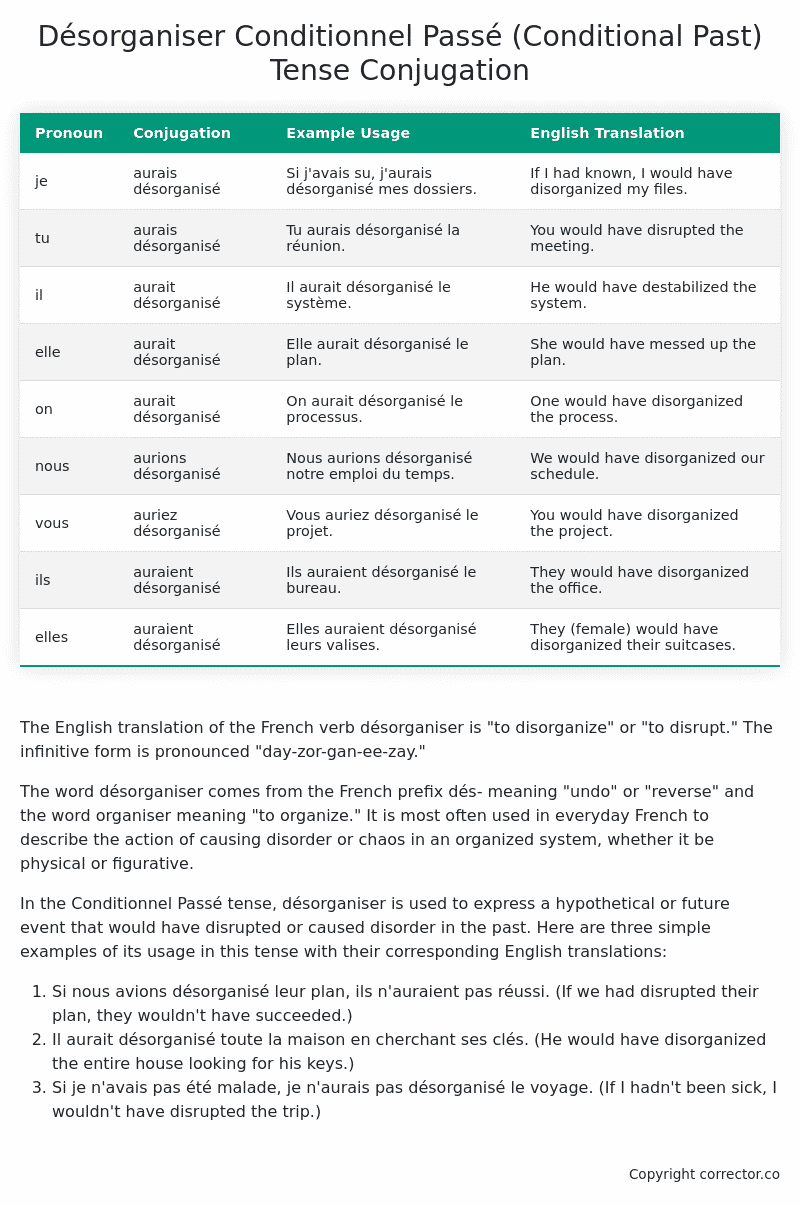Conditionnel Passé (Conditional Past) Tense Conjugation of the French Verb désorganiser
Introduction to the verb désorganiser
The English translation of the French verb désorganiser is “to disorganize” or “to disrupt.” The infinitive form is pronounced “day-zor-gan-ee-zay.”
The word désorganiser comes from the French prefix dés- meaning “undo” or “reverse” and the word organiser meaning “to organize.” It is most often used in everyday French to describe the action of causing disorder or chaos in an organized system, whether it be physical or figurative.
In the Conditionnel Passé tense, désorganiser is used to express a hypothetical or future event that would have disrupted or caused disorder in the past. Here are three simple examples of its usage in this tense with their corresponding English translations:
- Si nous avions désorganisé leur plan, ils n’auraient pas réussi. (If we had disrupted their plan, they wouldn’t have succeeded.)
- Il aurait désorganisé toute la maison en cherchant ses clés. (He would have disorganized the entire house looking for his keys.)
- Si je n’avais pas été malade, je n’aurais pas désorganisé le voyage. (If I hadn’t been sick, I wouldn’t have disrupted the trip.)
Table of the Conditionnel Passé (Conditional Past) Tense Conjugation of désorganiser
| Pronoun | Conjugation | Example Usage | English Translation |
|---|---|---|---|
| je | aurais désorganisé | Si j’avais su, j’aurais désorganisé mes dossiers. | If I had known, I would have disorganized my files. |
| tu | aurais désorganisé | Tu aurais désorganisé la réunion. | You would have disrupted the meeting. |
| il | aurait désorganisé | Il aurait désorganisé le système. | He would have destabilized the system. |
| elle | aurait désorganisé | Elle aurait désorganisé le plan. | She would have messed up the plan. |
| on | aurait désorganisé | On aurait désorganisé le processus. | One would have disorganized the process. |
| nous | aurions désorganisé | Nous aurions désorganisé notre emploi du temps. | We would have disorganized our schedule. |
| vous | auriez désorganisé | Vous auriez désorganisé le projet. | You would have disorganized the project. |
| ils | auraient désorganisé | Ils auraient désorganisé le bureau. | They would have disorganized the office. |
| elles | auraient désorganisé | Elles auraient désorganisé leurs valises. | They (female) would have disorganized their suitcases. |
Other Conjugations for Désorganiser.
Le Present (Present Tense) Conjugation of the French Verb désorganiser
Imparfait (Imperfect) Tense Conjugation of the French Verb désorganiser
Passé Simple (Simple Past) Tense Conjugation of the French Verb désorganiser
Passé Composé (Present Perfect) Tense Conjugation of the French Verb désorganiser
Futur Simple (Simple Future) Tense Conjugation of the French Verb désorganiser
Futur Proche (Near Future) Tense Conjugation of the French Verb désorganiser
Plus-que-parfait (Pluperfect) Tense Conjugation of the French Verb désorganiser
Passé Antérieur (Past Anterior) Tense Conjugation of the French Verb désorganiser
Futur Antérieur (Future Anterior) Tense Conjugation of the French Verb désorganiser
Subjonctif Présent (Subjunctive Present) Tense Conjugation of the French Verb désorganiser
Subjonctif Passé (Subjunctive Past) Tense Conjugation of the French Verb désorganiser
Subjonctif Imparfait (Subjunctive Imperfect) Tense Conjugation of the French Verb désorganiser
Conditionnel Présent (Conditional Present) Tense Conjugation of the French Verb désorganiser
Conditionnel Passé (Conditional Past) Tense Conjugation of the French Verb désorganiser (this article)
L’impératif Présent (Imperative Present) Tense Conjugation of the French Verb désorganiser
L’infinitif Présent (Infinitive Present) Tense Conjugation of the French Verb désorganiser
Struggling with French verbs or the language in general? Why not use our free French Grammar Checker – no registration required!
Get a FREE Download Study Sheet of this Conjugation 🔥
Simply right click the image below, click “save image” and get your free reference for the désorganiser Conditionnel Passé tense conjugation!

Désorganiser – About the French Conditionnel Passé (Conditional Past) Tense
Formation
Common Everyday Usage Patterns
Expressing Unreal Past Scenarios
Polite Requests or Suggestions
Expressing Doubt or Uncertainty
Interactions with Other Tenses
Conditional Present
Indicative Past Tenses
Conditional Future
Summary
Want More?
I hope you enjoyed this article on the verb désorganiser. Still in a learning mood? Check out another TOTALLY random French verb conjugation!


